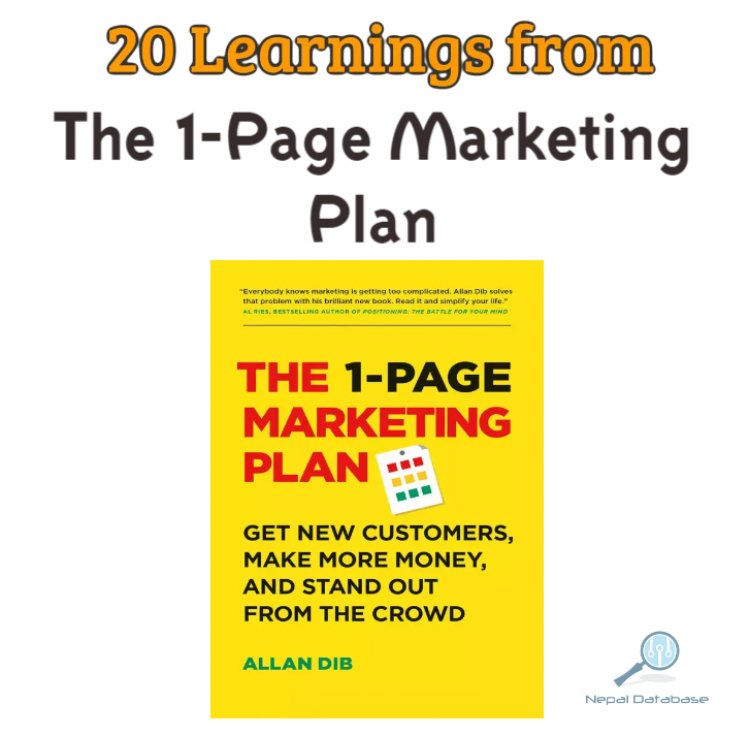20 Learnings from The 1-Page Marketing Plan
"The 1-Page Marketing Plan" book outlines a step-by-step process for identifying target customers, creating a unique value proposition, and developing a marketing strategy to reach and retain customers.

"The 1-Page Marketing Plan" is a book by Allan Dib that teaches readers how to create a simple, effective marketing plan on a single page. The book outlines a step-by-step process for identifying target customers, creating a unique value proposition, and developing a marketing strategy to reach and retain customers. Here are 20 key learnings from this book:
- A marketing plan should be simple and clear: A marketing plan should be simple and easy to understand, with clear goals and objectives.
- A marketing plan should focus on the target market: A marketing plan should focus on the target market and the specific needs and preferences of that market.
- A marketing plan should have a unique selling proposition: A marketing plan should have a unique selling proposition that sets it apart from competitors.
- A marketing plan should have a clear value proposition: A marketing plan should have a clear value proposition that outlines the benefits and value that a product or service offers to customers.
- A marketing plan should have a clear message: A marketing plan should have a clear, concise message that effectively communicates the unique selling proposition and value proposition.
- A marketing plan should have a clear call to action: A marketing plan should have a clear call to action that encourages customers to take action.
- A marketing plan should focus on the customer journey: A marketing plan should focus on the customer journey and identify opportunities to engage with customers at different stages.
- A marketing plan should focus on the customer experience: A marketing plan should focus on creating a positive customer experience that exceeds customer expectations.
- A marketing plan should focus on customer loyalty: A marketing plan should focus on building customer loyalty through ongoing engagement and providing value to customers.
- A marketing plan should have a budget: A marketing plan should have a budget that outlines the resources that will be used to implement the plan.
- A marketing plan should have measurable goals: A marketing plan should have measurable goals that allow for tracking progress and evaluating the effectiveness of the plan.
- A marketing plan should have a timeline: A marketing plan should have a timeline that outlines the specific actions that will be taken and when they will be taken.
- A marketing plan should have a marketing mix: A marketing plan should have a marketing mix that outlines the specific marketing tactics that will be used, such as advertising, public relations, and social media.
- A marketing plan should focus on content marketing: A marketing plan should focus on content marketing in order to engage with customers and build brand awareness.
- A marketing plan should focus on search engine optimization: A marketing plan should focus on search engine optimization in order to improve the visibility of a website in search results.
- A marketing plan should focus on email marketing: A marketing plan should focus on email marketing in order to build relationships with customers and promote products or services.
- A marketing plan should focus on social media marketing: A marketing plan should focus on social media marketing in order to engage with customers and build brand awareness.
- A marketing plan should focus on influencer marketing: A marketing plan should focus on influencer marketing in order to reach a larger audience and build credibility.
- A marketing plan should focus on video marketing: A marketing plan should focus on video marketing in order to engage with customers and build brand awareness.
- A marketing plan should be flexible: A marketing plan should be flexible and adaptable in order to respond to changes in the market and customer preferences.
In conclusion, "The 1-Page Marketing Plan" is a valuable resource for anyone looking to create a simple, effective marketing plan. By following the steps outlined in the book, you can gain a deep understanding of your target customers, create a unique value proposition, and develop a clear marketing strategy to reach and retain them. By tracking and measuring your results, you can continuously optimize your marketing plan and improve your overall performance. Implementing the principles and strategies outlined in the book can help you grow your business and achieve your marketing goals.
What's Your Reaction?



































































































